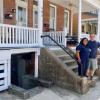The Lewes Beach Parking Committee is wrapping up a comprehensive analysis of various parking issues at the beach.
Members spent their Jan. 26 meeting finalizing recommendations for a report that will be submitted to mayor and city council in time for its February regular meeting. The group will meet once last time Wednesday, Feb. 3, to OK the report.
Among the 11 recommendations the committee is sending to council is a parking permit system, which gained unanimous support earlier this month. But much of the discussion at the Jan. 26 meeting centered on how the committee should address encroachments into the city’s right of way on streets between Cedar Street and Bay Avenue.
Committee member Kevin McGuiness said he doesn’t think it’s the committee’s job to draft very specific language for a policy on removing obstructions from the right-of-way. He thinks it’s more important to state the broad policy issues.
“I think some of these could be very, very arbitrary,” McGuiness said in reference to Councilman Rob Morgan’s draft recommendation on encroachments.
The city’s existing policy on removing impediments from the right-of-way was established in 2018. Morgan said the policy tasks city staff with determining if something should be removed, but it does not define the criteria that should be used.
With a right-of-way survey completed after the policy was established, Morgan said the beach parking committee now has enough information to beef up the policy.
“I think the policy is good, but it needs flesh, and that’s what we’re trying to give,” Morgan said.
City Manager Ann Marie Townshend said the city has consistently reviewed right-of-way obstructions when applications for a building permit or lease extension are received for specific properties.
Committee memeber Khalil Saliba agreed with McGuiness, saying that fine details are beyond the committee’s responsibility.
“I just could not wrap my arms around a specific criteria that would end up being applied equally and fairly,” Saliba said. “I’ve had a hard time figuring out how the city would reclaim rights-of-way without causing a firestorm and a whole host of chaos.”
He said he’s much more comfortable addressing the encroachment issue in a prospective manner.
“People now know where their rights of way are - there are stakes to show that,” he said. “If somebody is purposefully encroaching on that in order to preserve parking or anything along those lines, they now know they’re in the right-of-way. In the past, people didn’t know. They were never told.”
He said he’s in favor of letting every existing encroachment remain, but now notice has been given to residents and any future encroachment into the right-of-way can be reclaimed by the city.
Dennis Reardon supported the prospective approach too. He could’ve had a different opinion if the streets were consistent, but they are far from that, he said.
“As Lewes Beach was built out, there was no rhyme or reason or uniformity,” he said. “Each street needs to be addressed on its own merits. Trying to put [specific] criteria in here without looking at the total picture is missing the entire point.”
The committee ultimately voted 4-2 to move forward with a broad recommendation without specific criteria. Morgan was joined by Councilman Tim Ritzert in opposition.
Recommendations
- Annually re-stripe the lines delineating the parking spaces along Cedar Street at Children’s Beach House, Lewes Yacht Club and the prohibited parking areas 30 feet from stop signs on Cedar Street.
- Do not expand the paved parking lots at Beaches 1 & 2
- Where feasible and the change would result in the creation of additional parking space, move mailboxes to a clustered location, if permitted by USPS.
- The committee supports the current city right-of-way policy, especially with regard to its orientation toward prospective application and only where practicable. The committee would recommend that:
- The city’s application be consistent
- The city’s implementation be prospective, and that consideration be given to the city’s actions with regard to the property on which the property owner may have relied
- The policy be implemented and enforced
- The implementation will result in a net increase in parking spots
- The city take into consideration the importance of protecting and preserving trees and vegetation on Lewes Beach, and enhancing safety of those traveling in vehicles, bicycles and on foot.
• Paper streets – streets that appear on the Sussex County tax map as streets, but do not exist as such – on Cape Henlopen Drive should not be improved for public parking, and former paper streets that are now open space on Cedar Street may continue to provide informal parking, as has been already occurring.
• Council should favorably consider a parking permit system during high season on Lewes Beach, with many details to be worked out.
• Refer the issue of bicycling on Lewes Beach, including the creation of a bike lane and the issue of bike safety, to the Lewes Bicycle and Pedestrian Advisory Committee.
• Consider expanding the number of bike racks at Beaches 1 & 2 and Roosevelt Inlet and place bike posts or racks at a few of the beach accesses.
• “No parking” signage in Lewes Beach should be uniform and consistent, and priority should be given in the placement of signs to the protection of public safety, emergency vehicle access and ensuring that when parking is heavy every street is still accessible to vehicle traffic.
• Enforce the rules governing parking on Lewes Beach, giving special attention to compliance with the use of permit parking, if adopted; parking within designated parking areas, if adopted; and parking in prohibited areas.




















































